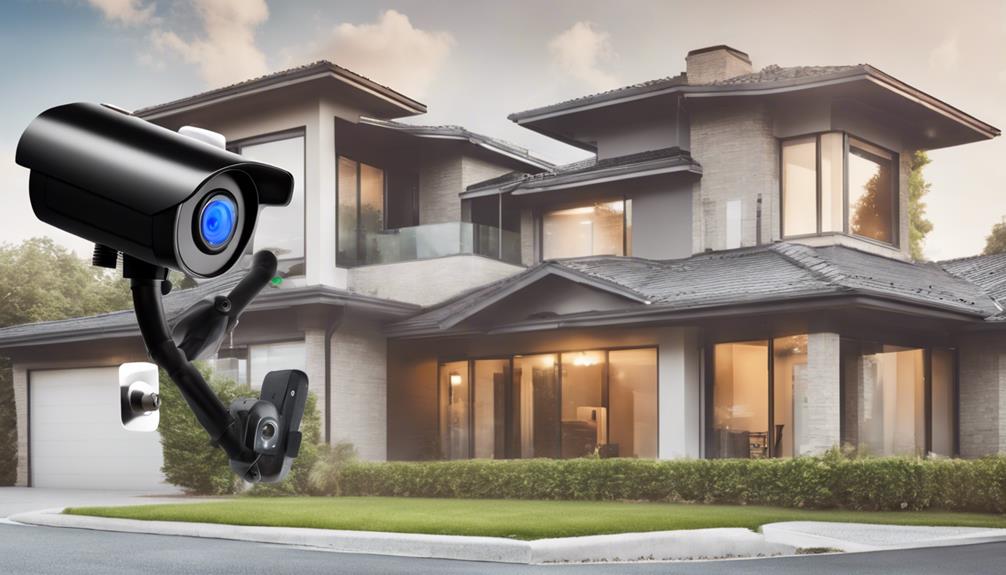Discover the cost of residential security systems averaging around $490. Basic kits start at $99, while advanced setups can exceed $2,000. Installation costs range from $600 to $1,200 for extensive systems. Monthly monitoring fees vary from $20 to $60, with options for self-monitoring at $10. Consider factors like professional installation fees and sensor costs when budgeting for security. Before diving into the details, exploring further insights on pricing breakdown by components, types of systems available, installation options, and factors affecting costs can help you make an informed decision to protect your home effectively.
Key Takeaways
- Average residential security system costs total around $490.
- Installation expenses range from $200 for DIY to $1,200 for professional setups.
- Monthly monitoring fees vary from $20 to $60.
- Individual sensors cost between $40 to $370 each.
- Wired systems installation costs range from $800 to $1,600.
Average Home Security System Costs
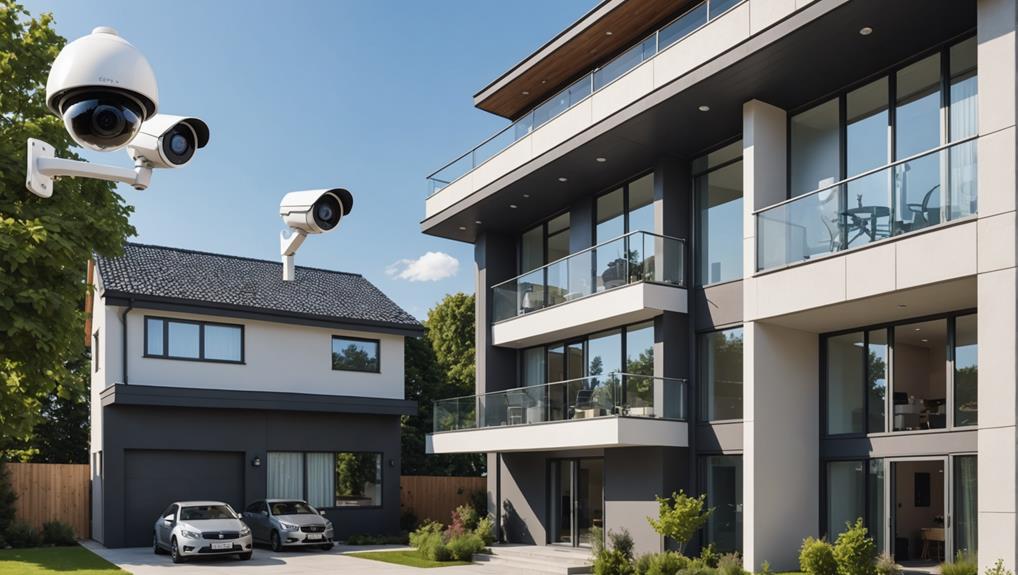
When evaluating the cost of residential security systems, the average expenditure for a home security setup hovers around $490. These systems often come with a variety of options, from basic self-installed kits starting at $99 to more advanced systems exceeding $2,000.
It's essential to mention that there are initial setup costs which can vary greatly depending on the complexity of the system chosen. Installation costs for extensive home security setups typically range between $600 and $1,200, with professional installations varying from $280 to $1,150 depending on complexity.
Monthly monitoring fees, which can provide professional services, usually fall between $20 and $60, while self-monitoring options can go as low as $10 per month.
Wired systems generally entail installation costs ranging from $800 to $1,600, while wireless systems may start at $200 and extend up to $2,000 based on the features included.
It's crucial to take these factors into account when choosing security packages and deciding between professional installation or DIY setups to guarantee a reliable and cost-effective home security solution.
Cost Breakdown by Components
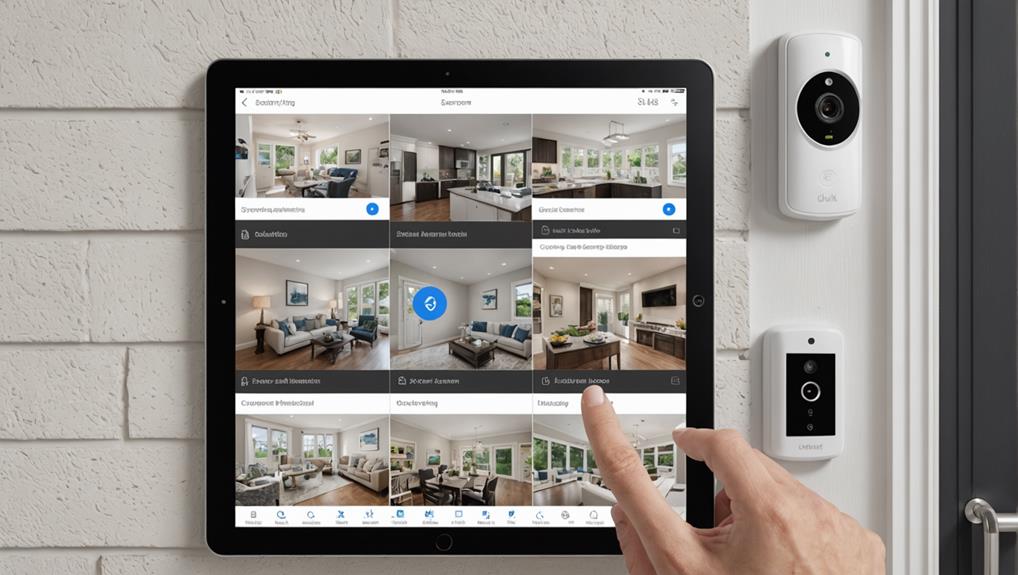
For an in-depth understanding of the cost breakdown by components of residential security systems, it's essential to dissect the various elements that contribute to the overall expenses.
Here are some key points to contemplate:
– Installation: Ranges from $200 for basic DIY setups to $600 for professional installations.
It's important to contemplate equipment updates and the potential for technology advancements that may require future investments.
- Monthly Fees: Vary between $20 to $60 for monitoring, with self-monitoring options as low as $6.99.
- Additional Equipment: Individual sensors can cost between $40 to $370 each.
- Activation Fees: Monitored systems may have activation fees up to $230.
- Professional Monitoring: Providers offer this service at different price points.
Understanding these components helps you gauge the total cost of your home security system.
Whether you opt for a DIY option or professional monitoring, each element contributes to the overall cost.
Pricing by System Type
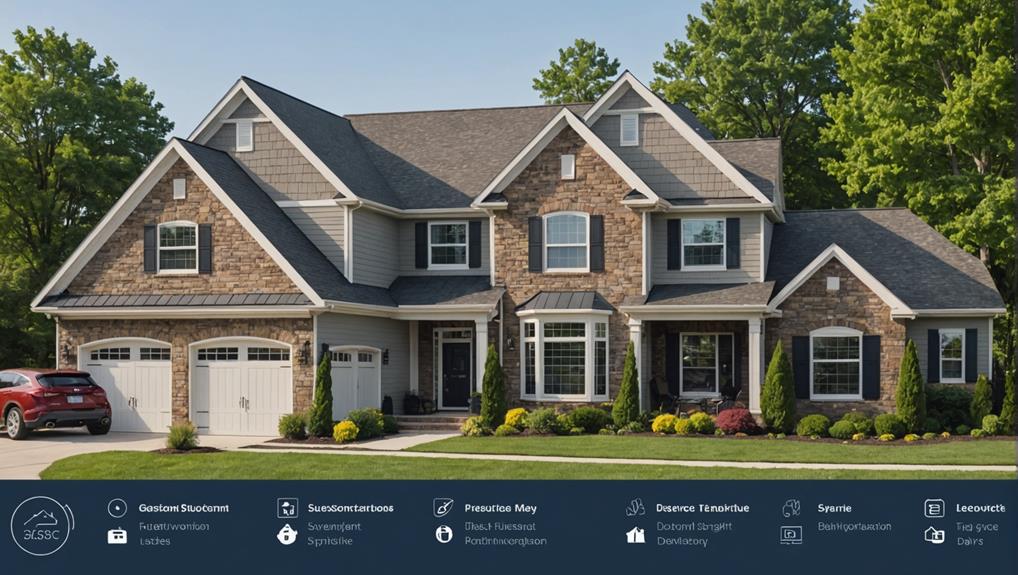
To understand the pricing variations based on system types, it is vital to take into account the range of options available to meet your home security needs. Home security companies offer various choices, from basic DIY home alarm systems to extensive smart home security setups. The cost of a home security system can vary considerably depending on the type you choose. Here is a breakdown of pricing based on system type:
| System Type | Price Range |
|---|---|
| Basic DIY | $200 – $1,200 |
| Wired Installation | $800 – $1,600 |
| Wireless Installation | $200 – $2,000 |
Consider the monthly payments, installation fees, and monitoring service costs when selecting the right system for your home. Whether you opt for professional surveillance or prefer self-monitoring, there are options to suit different budgets and needs. Selecting the right system is essential for ensuring the safety and security of your household.
Installation Cost Options
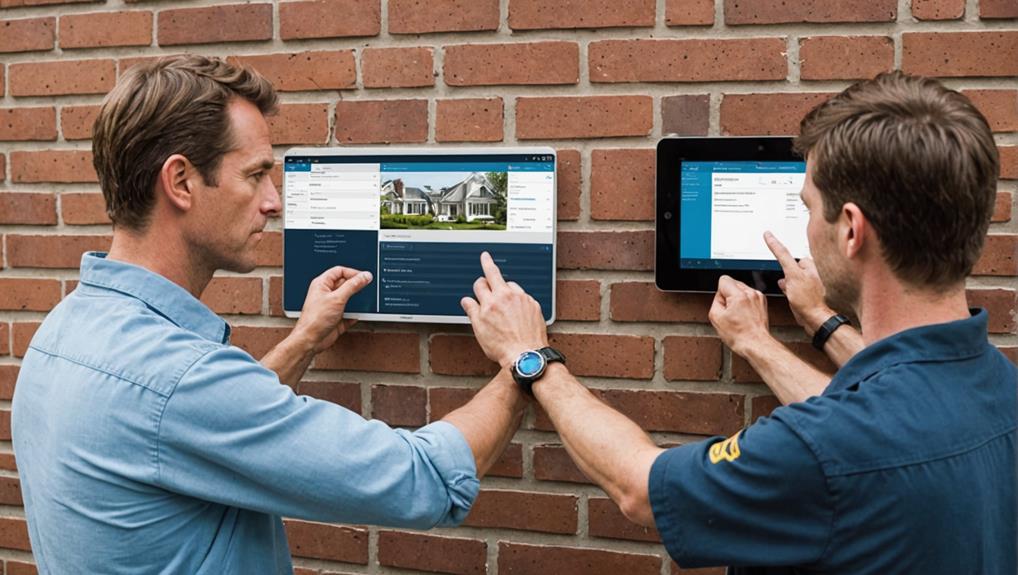
When considering installation cost options for residential security systems, it's vital to weigh the pros and cons of DIY versus professional installation.
DIY systems generally offer lower initial costs and flexibility, but may lack the thorough features and reliability of professionally installed systems.
You'll find that installation fees can vary markedly between providers, impacting the overall cost of your security system.
Additionally, analyzing monitoring costs is essential, as activation fees for monitored systems can contribute greatly to the initial setup expenses.
For a deeper understanding of the pros and cons of each option, consider factors like long-term reliability and support.
DIY vs. Professional Installation
Comparing the costs of DIY versus professional installation for residential security systems can provide valuable insights into the financial implications associated with setting up home security.
When deciding between the two options, here are some key points to bear in mind:
- DIY setup typically costs between $200 and $600, offering savings compared to professional installation fees ranging from $280 to $1,150.
- Installation fees vary by brand, with some companies like Abode and ADT charging around $99, while others like Brinks and Vivint may provide free installation.
- Professional installation includes warranties and support services, while DIY options offer more customization and flexibility without ongoing costs.
- Wired systems have higher installation fees ($800 to $1,600) than wireless systems (starting at $200).
- Your choice can impact long-term costs; DIY systems may eliminate monthly monitoring fees if self-monitored, while professional monitoring services cost $20 to $60 per month.
Installation Fees Comparison
With a wide range of installation fees associated with residential security systems, homeowners have various options to ponder when setting up their home security infrastructure. When considering installation costs, you can opt for professional installation services which can range from $99 to $1,150, or choose a DIY installation package starting around $200 to save on labor expenses. Wired systems typically incur higher installation costs, averaging between $800 and $1,600, while wireless systems generally have lower installation fees ranging from $200 to $2,000. Activation fees for monitored systems can add up to $230, so be sure to account for this additional cost. Some companies like SimpliSafe and Vivint offer free installation, making them attractive choices for those looking to avoid upfront installation expenses.
| Installation Type | Average Cost Range |
|---|---|
| Professional | $99 – $1,150 |
| DIY | $200+ |
| Wired | $800 – $1,600 |
| Wireless | $200 – $2,000 |
Monitoring Costs Analysis
To understand the monitoring costs associated with residential security systems, it's essential to explore the various options available beyond just the initial installation expenses.
Here are some key points to reflect on:
- Monthly monitoring fees can range from $10 for self-monitoring to $35 for professional monitoring.
- Activation fees for monitored systems may go up to $230, impacting initial setup costs.
- Extensive systems could lead to additional expenses depending on the features, with costs varying from $140 to over $1,200.
- Long-term costs should be taken into account, as cancellation fees might be as high as 100% of the remaining contract balance.
- DIY packages offer lower initial costs, while professional installations provide a more robust and reliable setup for long-term security needs.
Understanding these factors can help you make an informed decision when choosing a home security system that aligns with your budget and monitoring preferences.
Monthly Monitoring Expenses
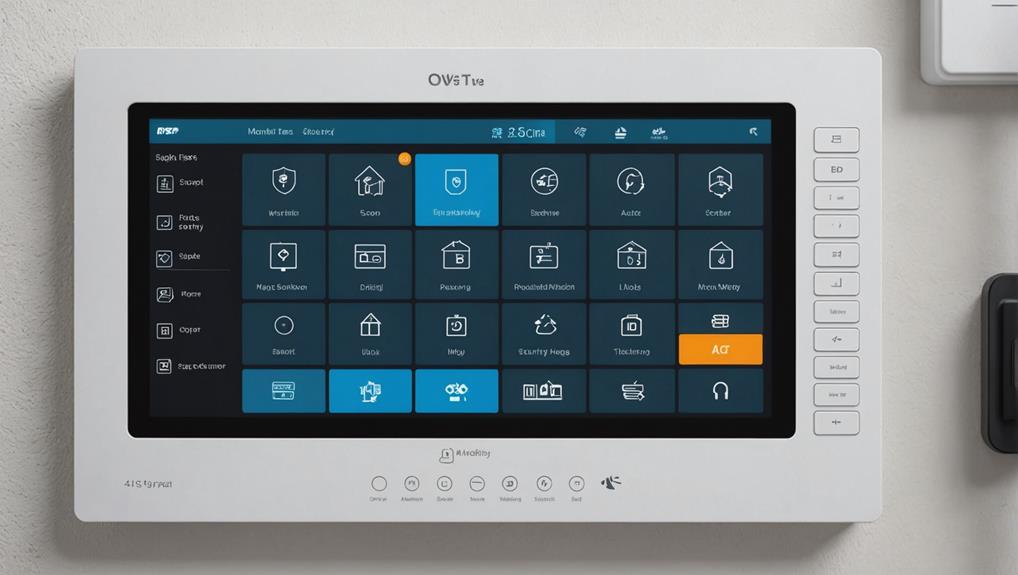
When considering residential security systems, monthly monitoring fees are a vital aspect to evaluate.
You'll find that costs can vary greatly between self-monitoring options and professional monitoring services.
Additionally, it's important to factor in the long-term expenses associated with each choice, as these can add up over time.
It's necessary to understand the impact these expenses can have on your overall security system budget and insurance savings.
Monitoring Cost Comparison
Monthly monitoring expenses for residential security systems vary based on the type of service selected.
When comparing costs, consider the following:
- Professional monitoring fees typically range from $20 to $60 per month.
- Self-monitoring options offer a budget-friendly alternative at around $10 per month.
- Specific providers like Abode and Ring have varying monthly subscription costs.
- Cancellation fees for monitored systems can be substantial, ranging from 75% to 100% of the remaining contract balance.
- Contract-free plans from providers like SimpliSafe and Vivint allow you to avoid long-term commitments and associated fees.
Understanding these cost differences can help you choose the monitoring service that best fits your needs and budget.
Whether you opt for professional monitoring or a self-monitored system, remember to factor in any cancellation fees and contract terms to make an informed decision.
DIY vs. Professional Monitoring
Considering the ongoing expenses associated with residential security systems, the choice between DIY self-monitoring and professional monitoring services can greatly impact your monthly budget.
DIY self-monitored systems typically range from $6.99 to $10 per month, offering cost-effective options. On the other hand, professional monitoring services from home security companies like Abode and Ring average between $20 and $35 monthly, ensuring round-the-clock emergency response and peace of mind.
Abode's self-monitoring plan starts at $6.99, while their professional monitoring plan costs $24.99 monthly. Similarly, Ring offers self-monitoring at $4.99 and professional monitoring from $10 to $20, providing flexibility in choosing the level of service.
ADT's professional monitoring starts at $20 per month, aligning competitively with other leading security brands.
Opting for self-monitoring can save you money on monthly fees, but it's crucial to weigh this against the level of security and immediate emergency response provided by professional monitoring services.
Impact on Insurance
Lowering your homeowners insurance premiums is a key benefit that can result from installing a home security system.
When considering the impact on insurance, keep in mind the following:
- Home security systems can potentially reduce premiums by up to 15%, offsetting monitoring costs.
- Monthly monitoring expenses for professional services range from $20 to $60, influencing overall cost-saving benefits on insurance.
- Self-monitoring options at around $10 per month may not qualify for insurance discounts as effectively as professionally monitored systems.
- Insurance companies consider the level of monitoring, such as 24/7 professional monitoring, when determining premium reductions.
- Insurers may require proof of installation and monitoring for applying discounts, highlighting the importance of maintaining documentation for any security system.
Evaluate the type of monitoring service to maximize insurance benefits while enhancing your home's security.
Additional Home Security Expenses
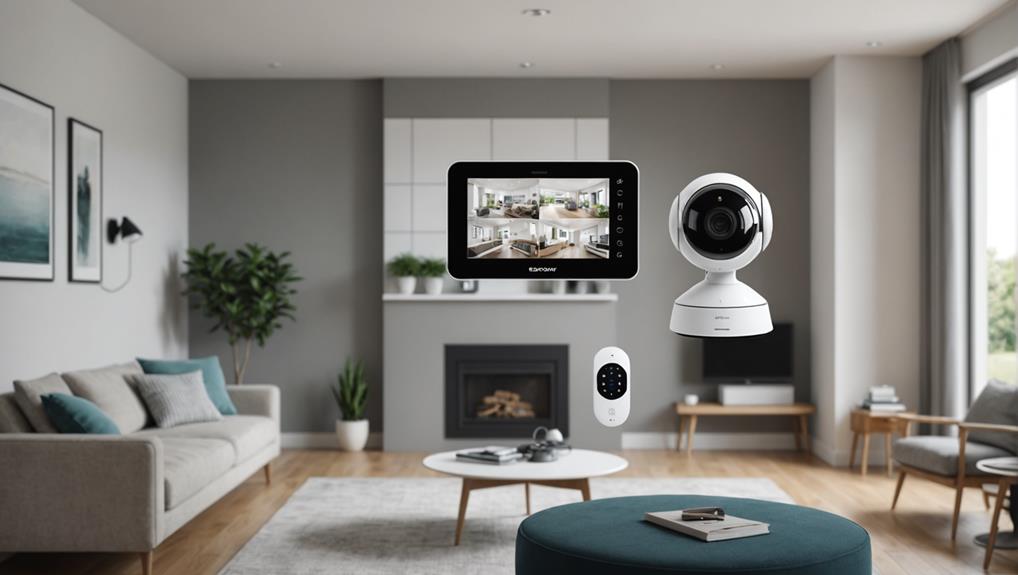
Exploring the domain of additional home security expenses reveals various costs that can accompany the installation and maintenance of a residential security system.
When setting up your home security system, be prepared for installation fees which can range from $100 to $400, depending on whether you opt for professional installation or choose the DIY route. According to some practical advice on how homeowners can reduce costs, opting for a DIY setup can greatly cut initial expenses.
Furthermore, activation fees for monitored systems may add up to $230 to the initial cost. The largest ongoing expense for homeowners using professional monitoring services is the monthly monitoring fees, typically ranging from $20 to $60.
Don't forget that many cities require alarm permits, which can cost between $40 to $550 and should be factored into your security budget.
In addition, maintenance costs, such as annual battery replacements averaging around $10, are essential for the long-term upkeep of your system.
Factors Impacting System Costs
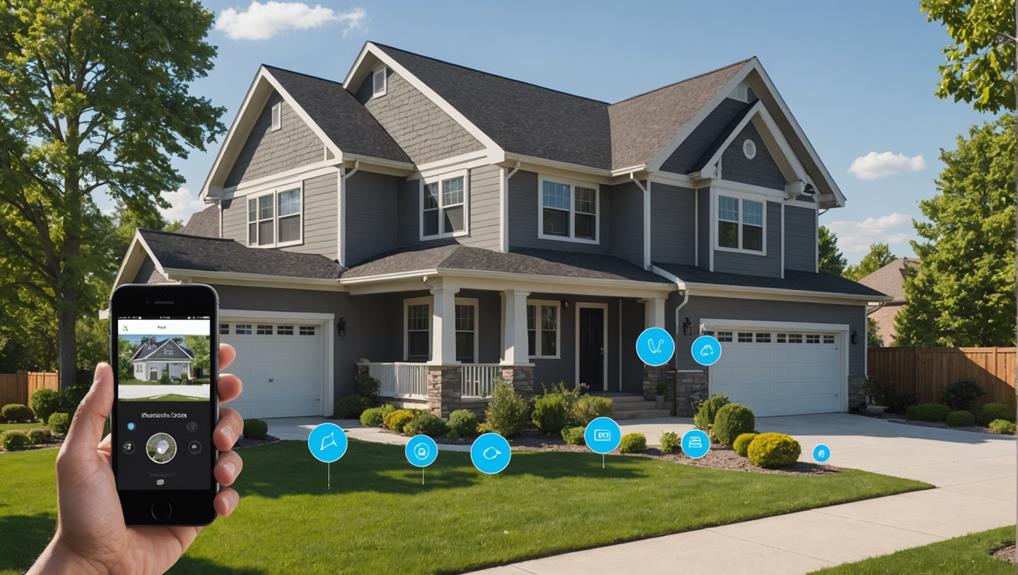
When selecting a residential security system, the type chosen, whether wired or wireless, plays a considerable role in determining installation costs.
Wired systems typically range from $800 to $1,600, while wireless options can start as low as $200 and go up to $2,000 based on features. Wireless systems are often favored for their ease of installation and flexibility.
Learn more about selecting the right type of security system based on your home's needs, budget, and personal preferences.
Here are five key factors impacting system costs:
- Monthly monitoring fees ranging from $20 to $60 can considerably affect overall expenses.
- Installation costs vary based on complexity, with professional setups averaging between $280 and $1,150.
- Additional features like smart home compatibility and advanced sensors can increase initial equipment costs.
- Activating monitored systems may include fees of up to $230, adding to upfront investments.
- The number and type of sensors required can impact costs, with sensor prices ranging from $40 to $370 each.
Considering these factors will help you make informed decisions when investing in a residential security system.
Cost-Effective Security System Tips
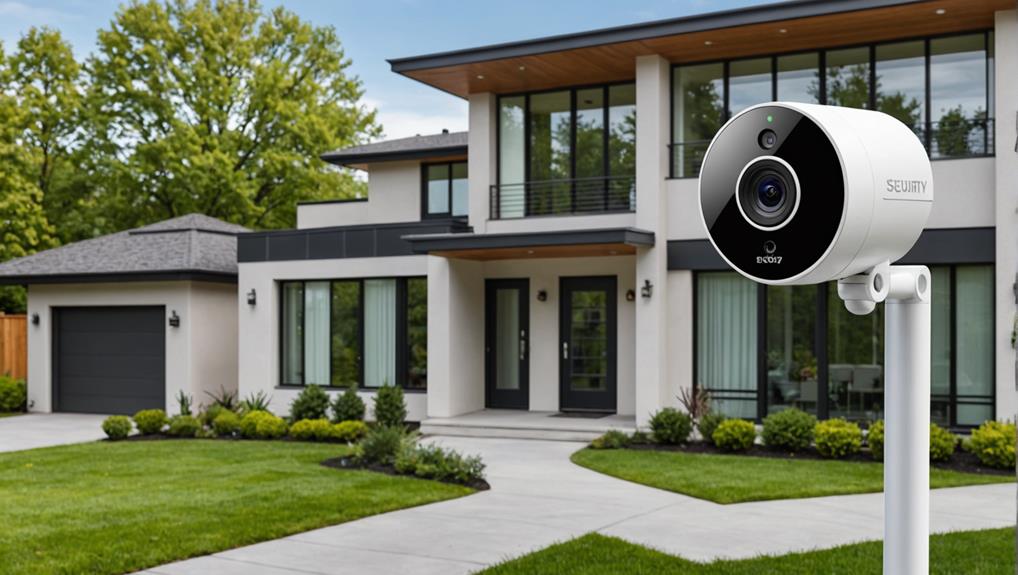
To make the most cost-effective choices when it comes to your residential security system, consider implementing strategies that can help you save on initial installation and ongoing monitoring expenses.
Opt for DIY installation to save on labor costs, with basic self-installed kits starting at $99. Choose wireless security systems for easier installation and lower fees, ranging from $200 to $2,000.
For more options, visit this overview of cost-effective security solutions. Save money by selecting self-monitoring plans at around $10 per month instead of professional monitoring that can cost $20 to $60 monthly.
Look for home insurance discounts of up to 15% for having a security system installed, offsetting initial costs. Regularly review your security needs to invest wisely, avoiding unnecessary expenses on thorough monitoring and advanced features.
Frequently Asked Questions
How Much Does the Average Person Spend on Home Security Systems?
You typically spend around $490 on a home security system, but prices vary widely.
Monthly monitoring fees can range from $20 to $60, with installation costs varying from $99 for DIY to over $800 for professional setups.
Additional expenses like equipment upgrades, activation fees (up to $230), and maintenance costs may also apply.
Keep in mind potential insurance premium savings of up to 15% with a security system.
What Is the Average Cost of an ADT Alarm System?
The average cost of an ADT alarm system ranges from $146 to $560, depending on the features and equipment you choose.
Keep in mind that there's usually a $99 installation fee, and monthly monitoring can start at about $20.
ADT also offers more extensive plans for around $60 monthly.
Activation fees may go up to $230.
Plus, they provide a warranty on their equipment, adding value and peace of mind.
Is It Worth Investing in Home Security System?
Investing in a home security system is definitely worth it for your peace of mind and protection.
It can deter burglars, provide real-time alerts, and even lower your insurance premiums.
With the integration of smart home technology, these systems add value to your property.
What Are the Top Five Home Security Systems?
When looking for top home security systems, consider brands like SimpliSafe, Vivint, Ring Alarm, Abode, and Xfinity Home.
These options offer various features and pricing plans to meet your needs.
SimpliSafe provides easy DIY installation and extensive features.
Vivint offers a polished experience with no contracts.
Ring Alarm is great for DIY enthusiasts.
Abode caters to those seeking flexibility.
Xfinity Home provides competitive pricing and monitoring options.
Conclusion
Overall, the cost of residential security systems can vary depending on the components, system type, installation options, and monitoring expenses. It's important to take into account all these factors and choose a system that fits your budget while still providing the level of security you need for your home. By being mindful of additional expenses and implementing cost-effective tips, you can guarantee that your home is protected without breaking the bank.

